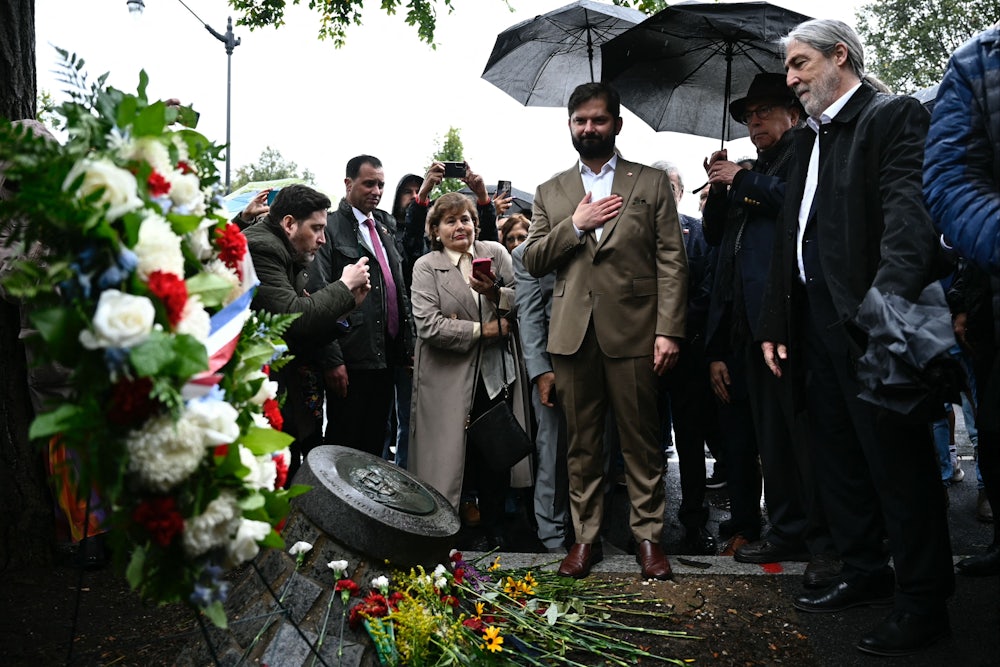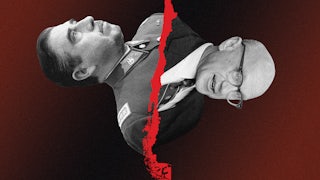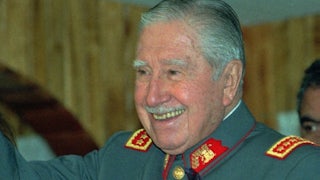Every diaspora has its martyrs. For exiles of Chilean dictator Augusto Pinochet like my family and me, Orlando Letelier and Ronni Moffitt are two of ours. They were both assassinated with a car bomb in Washington, D.C., that was ordered by Chile’s secret police in 1976.
Unknown thousands of Chileans were slain under Pinochet, who ruled from 1973 to 1990. But the killing of Letelier and Moffitt was remarkable for its brazenness. The car bomb was detonated on Embassy Row in Washington, D.C.—in a prominent and very international section of America’s capital city and less than a mile and a half from the White House.
Last Saturday, Chilean President Gabriel Boric spoke, just a few yards from the scene of the crime, to commemorate the forty-seventh anniversary of Pinochet’s brazen attack on American soil. The music of Victor Jara played gently over the loudspeaker to greet the South American president’s arrival. Jara is another of the dictatorship’s martyrs. The iconic folk singer was killed in Chile’s national stadium shortly after the coup. Legend has it that Pinochet’s men broke his hands, then handed him a guitar to mock him before riddling his body with bullets.
“Coup d’états are never inevitable,” said Boric. Roughly 200 people attended Saturday’s ceremony, which was dampened by rain showers on Embassy Row. “Democracy always has a path.” The left-leaning, millennial head of state quoted a poem by Pablo Neruda, my namesake and another Pinochet martyr, whom Boric was quick to point out died under “very strange circumstances.” A February report by international forensic experts revealed that Neruda, who the Pinochet regime always maintained had died of natural causes, was likely poisoned. Boric called on the Chilean courts to get to the bottom of why Neruda was silenced.
Exile, not death, was Letelier’s fate. An early supporter of President Salvador Allende, Letelier was the first high-ranking government official detained during the coup that saw his boss slain and Pinochet installed as dictator on September 11, 1973. Letelier fled first to Caracas before landing at the Institute for Policy Studies, a progressive think tank in Washington, D.C., where Letelier had been Chile’s ambassador under Allende.
Within a year in the capital, Letelier established himself as a leading international voice of resistance against the Pinochet regime and its stateside enablers. In February 1976—just seven months before he was assassinated—Letelier helped torpedo a $60 million investment in Chile by convincing the Dutch trade unions to boycott Chilean products.
The following month, Letelier convinced a delegation of three congressional Democrats to visit Chile. Back on Capitol Hill, the lawmakers’ eyewitness accounts of brutal repression under Pinochet convinced Senator Edward Kennedy to lead the fight in Congress to eliminate economic and military aid to Chile.
Letelier was taking meetings with party leaders to strategize about Chile after the dictatorship when Pinochet finally had him murdered. Moffitt, Letelier’s 25-year-old assistant, was collateral damage. Letelier was cut in half by the explosion on the warm autumn day, dying instantly. Moffitt took a tiny piece of shrapnel through her carotid artery and died on the pavement, choking on her own blood as her husband tried to save her. Two years later, a grand jury in the District of Columbia convicted the head of Chile’s secret police of the crime, but the message Pinochet sent to the dictatorship’s exiles around the world was clear.
“We knew this dictatorship has a lot of power, because it’s capable of killing in the United States,” said my father, Luis Manríquez, another Pinochet exile, who learned of the Letelier assassination as a teenager in Santiago reading Solidaridad, an underground newspaper published by the Roman Catholic Church and distributed in secret. “Solidaridad reported on the torture and deaths under Pinochet,” my father recalled in a phone interview Sunday, adding that it’s important that Boric has publicly recognized that the Chilean state assassinated Letelier, who was represented at Saturday’s ceremony by two of his living sons.
“In Chile today there are those who believe that the coup was correct,” said Juan Pablo Letelier of the U.S.-backed action that deposed Allende. “And it’s the same type of people like those who stormed Capitol Hill” on January 6, he added.
Moffitt’s brother, Michael Karpen, also compared Pinochet’s coup and Donald Trump’s coup attempt, in an interview with The New Republic. “What happened in Chile happened in an instant. I guess the analogy here is kind of a slow boil,” Karpen said. “I’m just concerned that we will have to go through similar pain and suffering.”
Representative Jamie Raskin was also on hand Saturday to present his House resolution with Representative Alexandria Ocasio-Cortez to recognize the Chilean dissidents who helped end the dictatorship. “It expresses profound regret for the U.S. contribution to destabilizing democratic institutions in Chile,” said Raskin of his resolution, which was introduced in the Senate by Bernie Sanders and Tim Kaine.
Ocasio-Cortez recently traveled to Chile with Democratic Representatives Nydia Velasquez, Joaquin Castro, Greg Casar, and Maxwell Frost, and they visited the museum in Santiago dedicated to preserving the memory of Pinochet’s victims. “For years, the U.S. has refused to disclose the extent of its involvement,” wrote Ocasio-Cortez upon returning stateside, touting her role in declassifying documents relating to the 1973 coup, “and while there are still many documents that should be declassified, this was an important first step.”
The New Republic sent multiple inquiries to Ocasio-Cortez’s team to ask which specific documents have been declassified but has received no response as of this writing. A spokesperson for House Speaker Kevin McCarthy did not immediately reply when asked if the Raskin–Ocasio-Cortez resolution would be brought to the floor.
Among the attendees of Boric’s speech on Saturday were a dozen Chilean adoptees organized by Nos Buscamos, an NGO that investigates cases of child trafficking by the Pinochet regime and connects the living relatives of nonconsensual adoptions. “I can tell you have Chilean eyes,” said Sara Elena Rosenblatt, an adoptee I interviewed for this story.
“I always knew I was adopted, but the story of my adoption took on a life of its own—especially on birthdays,” said Rosenblatt, who learned that she had been stolen from her mother after reading a 2021 article in The New York Times. “It’s life-changing to see yourself in the family you’re just now meeting,” she said of meeting her biological mother and siblings for the first time in Chile last year.
In 2014, the Chilean government began investigating thousands of child-trafficking cases under Pinochet. Nos Buscamos now seeks reparations from the Chilean state for the dictatorship’s child-trafficking victims like Rosenblatt.
Boric stopped short of supporting reparations in his remarks on Saturday, but he did say that reconciliation for the victims of Chile’s dictatorship is only possible through acts of truth and justice. “Not through forgetting,” he said.






